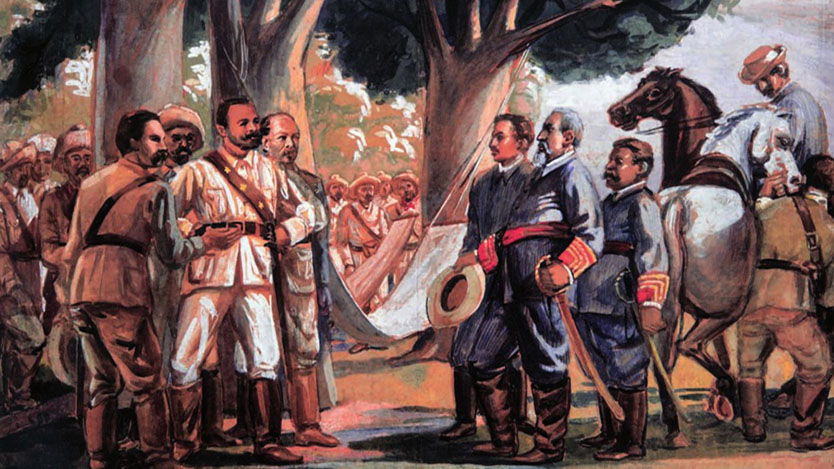
At the beginning of 1878, Máximo Gómez wrote about the insurgent camp in his War Diary: “A complete demoralization is noted and everyone's spirits are overwhelmed; both because of the constant operations of the enemy and because of the division of the Cubans”.
The Revolution was deprived of its leadership bodies because Tomás Estrada Palma, President of the Republic in Arms, was arrested for a denunciation and his replacement, Francisco Javier de Céspedes, resigned and Gómez also did so as Secretary of War, while taking force the capitulating trend between not a few leaders of the center and the eastern region itself.
The most immediate antecedents of this situation can be established from the middle of 1876, with the arrival on the Island of Arsenio Martínez Campos as Captain General, in command of a reinforcement of 20 infantry, cavalry and artillery battalions, together with units of engineers and telegraphs, with which the colonial forces amounted to more than 100,000 troops against around 8,000 rebels.Despite this, the Spanish chief did not achieve greater glory in the battles against the Cubans, neither in that war nor in the 1895 War, when he was sent again at the start of the fighting.
Nevertheless, Martínez Campos was an intelligent and skilful boss, who from Spain earned the nickname El Pastelero for his capacity for compromises between the factions and negotiations, which he also applied in Cuba due to the lack of war resources and supplies for the soldiers. Cubans, which he combined with peace proposals moderating repressive measures, but with an increase in military operations.
With his stealthy way of acting, he contacted many chiefs, most of them of wealthy origin who had lost their property in the war, and made proposals for peace, for integration into a reformed colonial society with hopes of economic compensation for the nation, but without independence, nor abolition of slavery, which convinced many already tired of the war.
The bases of an agreement were stipulated in Camagüey by a group of rebel representatives in February 1878, approved by General Martínez Campos, and became known as the Zanjón Pact. The Spanish command considered it only an easy procedure for their interests to inform Antonio Maceo, the most important chief, and his comrades still in arms of the terms of the agreements.
Confident of his success and with the conditions of the Pact in the saddlebag of his horse, he set out on the road to Mangos de Baraguá, in the east of the Island, to meet Maceo, the last of the main insurgents who was essential to add to the treaty.

Martínez Campos, trained in the old and racist colonial military aristocracy, could not appraise the true historical and moral stature of that mulatto of humble origins, who as a soldier rose to the highest positions by force of courage and intelligence and who that day, 15 March 1878, would ruin his plans to save colonialism in Cuba.
For the Spanish chief, everything came down to impressing his interlocutor with his speech, acknowledging his sacrifice, but qualifying it as useless and extolling a dignified peace with Spain in exchange for dubious promises of reforms, and finally deploying the document with the conditions of the Zanjón Pact ready to be signed.Maceo changed the script of the Hispanic and without waiting for more formalities; he communicated his disagreement with the treaty and the decision to continue the war, because it did not establish the independence of Cuba or the abolition of slavery.
The Captain General was taken aback by such an attitude, which was obviously not in his plans, and the only thing that was agreed upon in the interview was the resumption of hostilities within eight days so that the troops could return to their respective territories.
The tension of the moment broke when the Cuban captain Fulgencio Duarte exclaimed: "Boys, the 23rd breaks the chorus!", while Martínez Campos spurred his horse and galloped from the place.
Despite the fact that Maceo and his companions had little chance of continuing the military operations, he made it clear that the true patriots would not renounce the independence ideal for which they had fought for 10 years.
The Bronze Titan with his feat saved the Revolution from that spurious peace trap, and made possible the "fertile truce" that followed 1878, in which José Martí, together with the seasoned insurgent leaders, prepared and carried out the War Required from 1895-1898.
Martí described the Baraguá Protest as "one of the most glorious in our history" and today it is recognized as an example of revolutionary resistance and intransigence.




